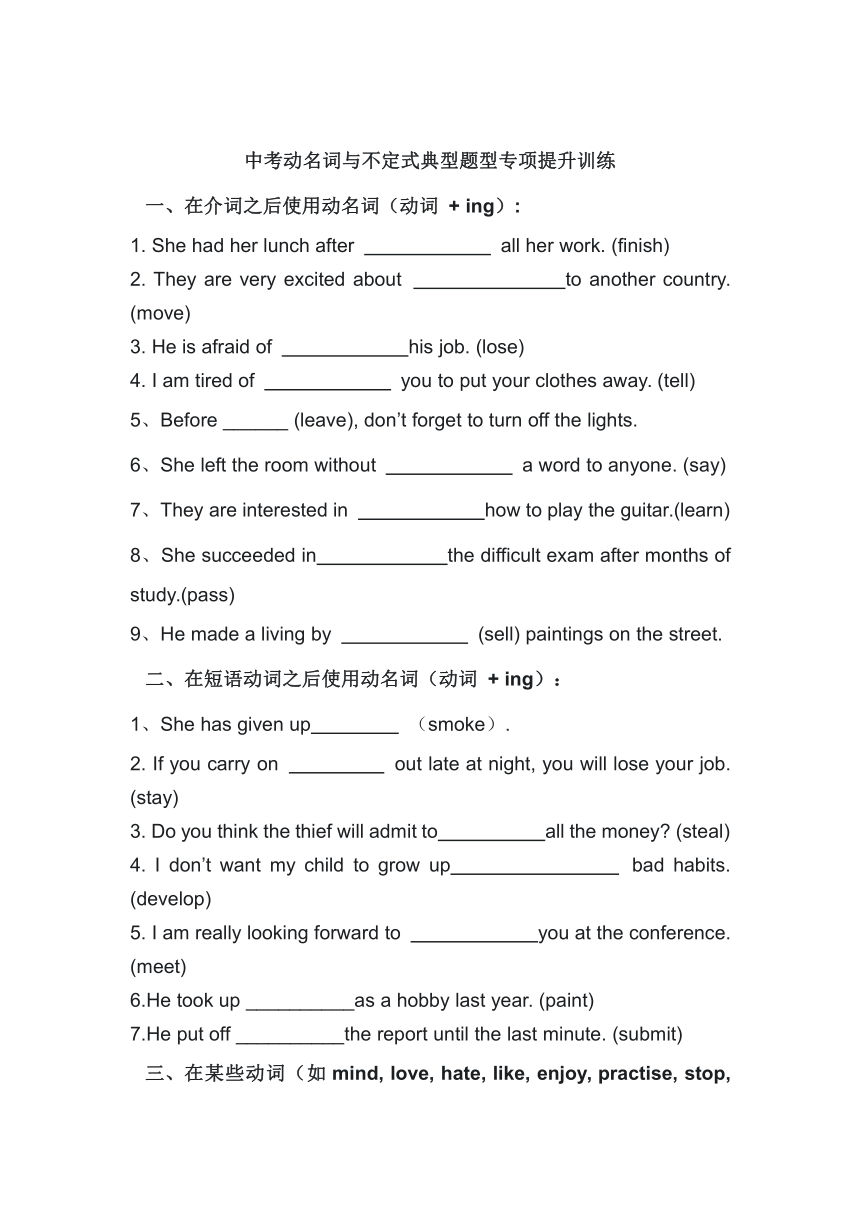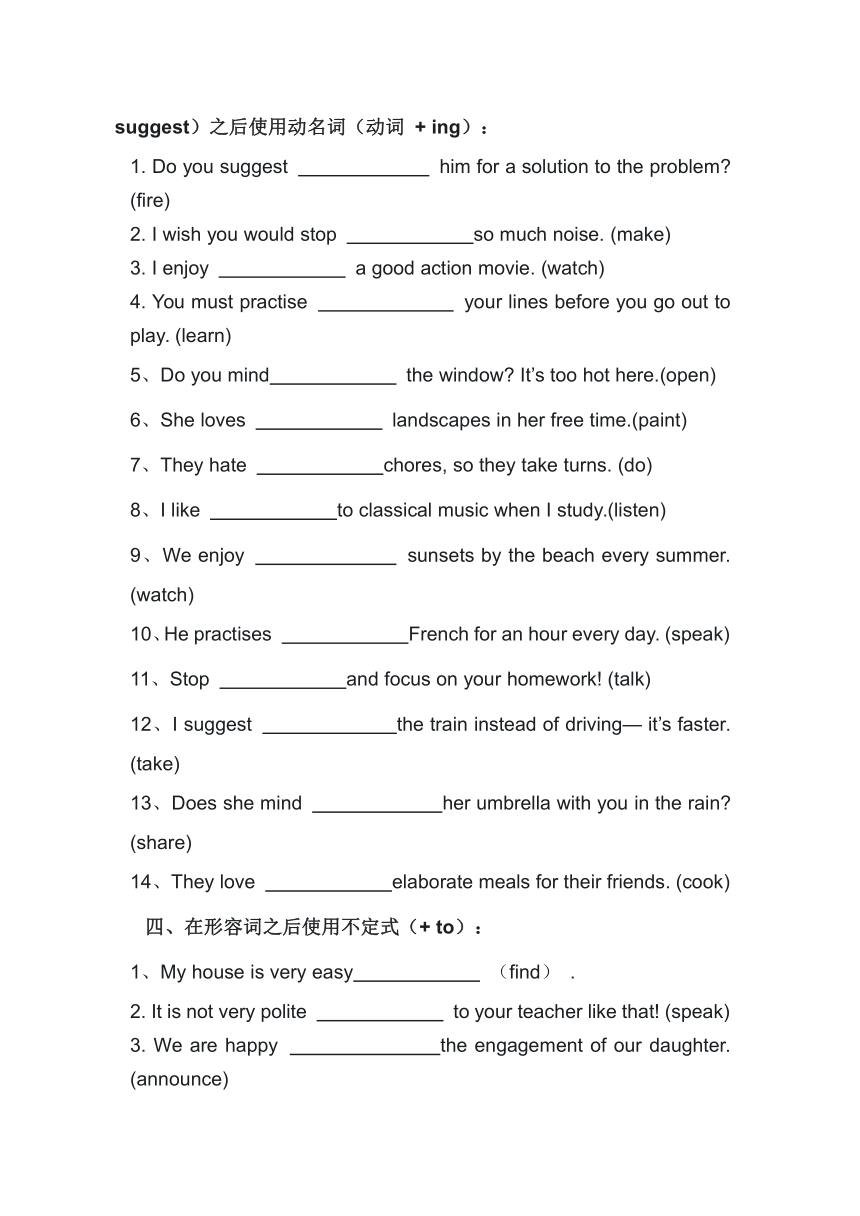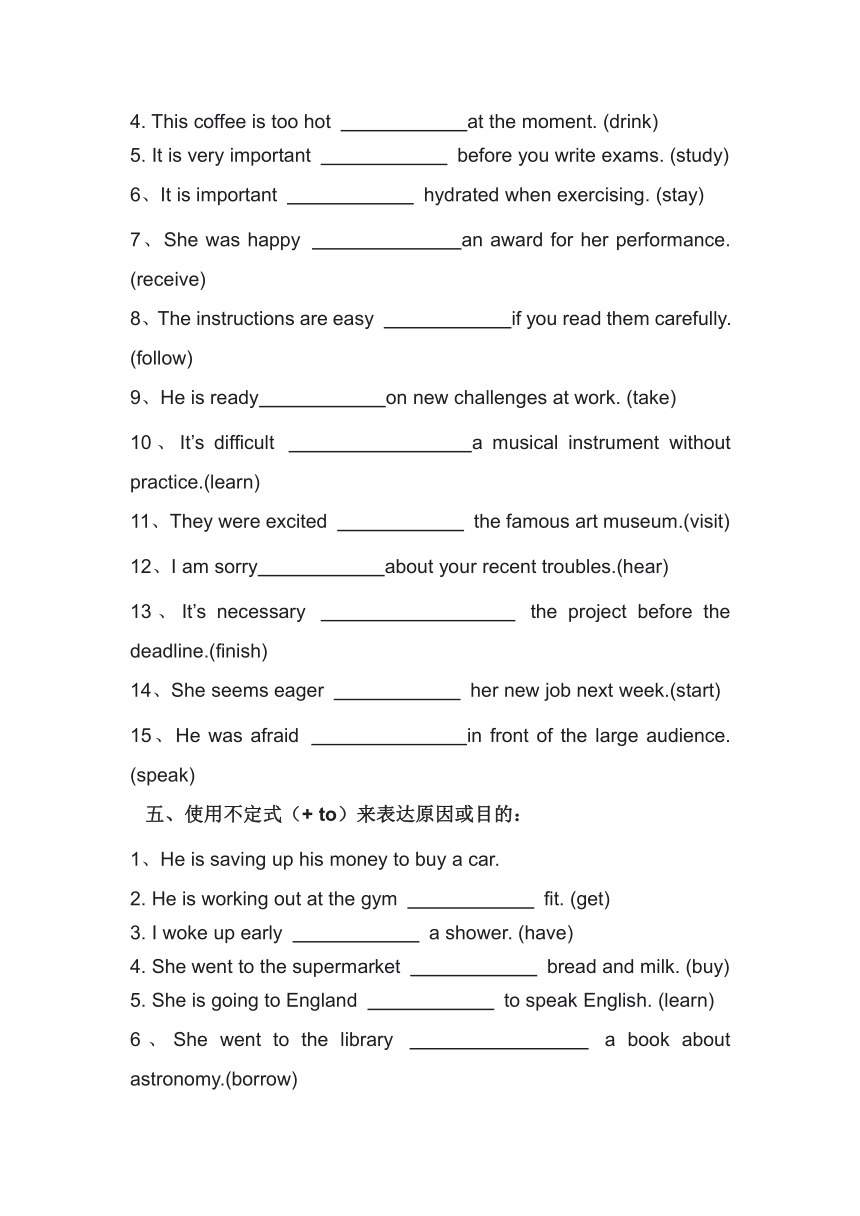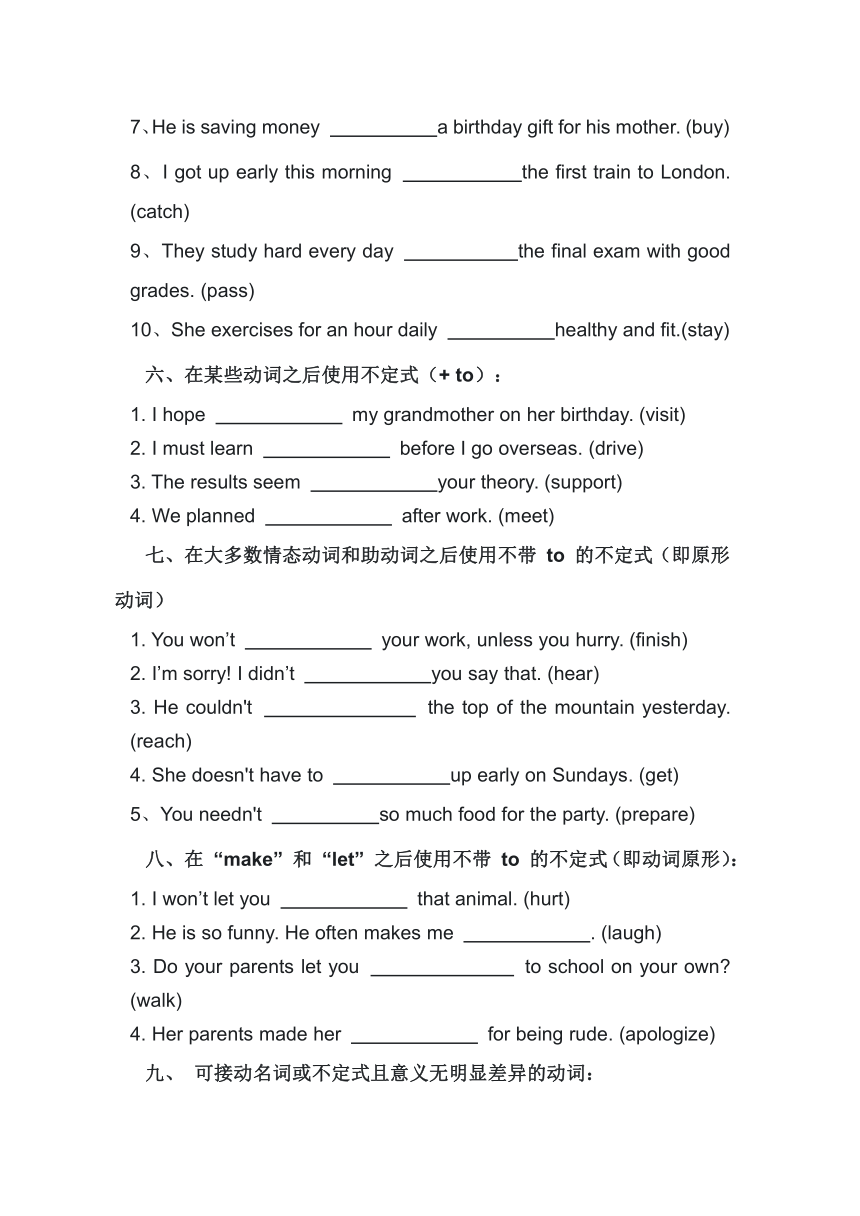2025年中考英语语法复习之动名词与不定式典型题型专项提升训练(含答案)
文档属性
| 名称 | 2025年中考英语语法复习之动名词与不定式典型题型专项提升训练(含答案) |

|
|
| 格式 | docx | ||
| 文件大小 | 23.5KB | ||
| 资源类型 | 教案 | ||
| 版本资源 | 人教版 | ||
| 科目 | 英语 | ||
| 更新时间 | 2025-05-05 18:39:31 | ||
图片预览





文档简介
中考动名词与不定式典型题型专项提升训练
在介词之后使用动名词(动词 + ing):
1. She had her lunch after all her work. (finish)
2. They are very excited about to another country. (move)
3. He is afraid of his job. (lose)
4. I am tired of you to put your clothes away. (tell)
5、Before ______ (leave), don’t forget to turn off the lights.
6、She left the room without a word to anyone. (say)
7、They are interested in how to play the guitar.(learn)
8、She succeeded in the difficult exam after months of study.(pass)
9、He made a living by (sell) paintings on the street.
在短语动词之后使用动名词(动词 + ing):
1、She has given up (smoke).
2. If you carry on out late at night, you will lose your job. (stay)
3. Do you think the thief will admit to all the money (steal)
4. I don’t want my child to grow up bad habits. (develop)
5. I am really looking forward to you at the conference. (meet)
6.He took up __________as a hobby last year. (paint)
7.He put off __________the report until the last minute. (submit)
在某些动词(如mind, love, hate, like, enjoy, practise, stop, suggest)之后使用动名词(动词 + ing):
1. Do you suggest him for a solution to the problem (fire)
2. I wish you would stop so much noise. (make)
3. I enjoy a good action movie. (watch)
4. You must practise your lines before you go out to play. (learn)
5、Do you mind the window It’s too hot here.(open)
6、She loves landscapes in her free time.(paint)
7、They hate chores, so they take turns. (do)
8、I like to classical music when I study.(listen)
9、We enjoy sunsets by the beach every summer. (watch)
10、He practises French for an hour every day. (speak)
11、Stop and focus on your homework! (talk)
12、I suggest the train instead of driving— it’s faster. (take)
13、Does she mind her umbrella with you in the rain (share)
14、They love elaborate meals for their friends. (cook)
在形容词之后使用不定式(+ to):
1、My house is very easy (find) .
2. It is not very polite to your teacher like that! (speak)
3. We are happy the engagement of our daughter. (announce)
4. This coffee is too hot at the moment. (drink)
5. It is very important before you write exams. (study)
6、It is important hydrated when exercising. (stay)
7、She was happy an award for her performance. (receive)
8、The instructions are easy if you read them carefully. (follow)
9、He is ready on new challenges at work. (take)
10、It’s difficult a musical instrument without practice.(learn)
11、They were excited the famous art museum.(visit)
12、I am sorry about your recent troubles.(hear)
13、It’s necessary the project before the deadline.(finish)
14、She seems eager her new job next week.(start)
15、He was afraid in front of the large audience. (speak)
使用不定式(+ to)来表达原因或目的:
1、He is saving up his money to buy a car.
2. He is working out at the gym fit. (get)
3. I woke up early a shower. (have)
4. She went to the supermarket bread and milk. (buy)
5. She is going to England to speak English. (learn)
6、She went to the library a book about astronomy.(borrow)
7、He is saving money a birthday gift for his mother. (buy)
8、I got up early this morning the first train to London. (catch)
9、They study hard every day the final exam with good grades. (pass)
10、She exercises for an hour daily healthy and fit.(stay)
在某些动词之后使用不定式(+ to):
1. I hope my grandmother on her birthday. (visit)
2. I must learn before I go overseas. (drive)
3. The results seem your theory. (support)
4. We planned after work. (meet)
在大多数情态动词和助动词之后使用不带 to 的不定式(即原形动词)
1. You won’t your work, unless you hurry. (finish)
2. I’m sorry! I didn’t you say that. (hear)
3. He couldn't the top of the mountain yesterday. (reach)
4. She doesn't have to up early on Sundays. (get)
5、You needn't so much food for the party. (prepare)
在 “make” 和 “let” 之后使用不带 to 的不定式(即动词原形):
1. I won’t let you that animal. (hurt)
2. He is so funny. He often makes me . (laugh)
3. Do your parents let you to school on your own (walk)
4. Her parents made her for being rude. (apologize)
可接动名词或不定式且意义无明显差异的动词:
1. Do you prefer tea or coffee (drink)
2. He was about to begin when the bomb exploded. (speak)
3. You must continue your best. (try)
4. Would you prefer to London or Paris (go)
以下是这些练习题的答案:
一、在介词之后使用动名词(动词 + ing)
finishing
moving
losing
telling
leaving
saying
learning
passing
selling
二、在短语动词之后使用动名词(动词 + ing)
smoking
staying
stealing
developing
meeting
painting
submitting
三、在某些动词(如 mind, love, hate 等)之后使用动名词(动词 + ing)
firing
making
watching
learning
opening
painting
doing
listening
watching
speaking
talking
taking
sharing
cooking
四、在形容词之后使用不定式(+ to)
to find
to speak
to announce
to drink
to study
to stay
to receive
to follow
to take
to learn
to visit
to hear
to finish
to start
to speak
五、使用不定式(+ to)来表达原因或目的
2. to get
3. to have
4. to buy
5. to learn
6. to borrow
7. to buy
8. to catch
9. to pass
10. to stay
六、在某些动词之后使用不定式(+ to)
to visit
to drive
to support
to meet
七、在大多数情态动词和助动词之后使用不带 to 的不定式(即原形动词)
finish
hear
reach
get
prepare
八、在 “make” 和 “let” 之后使用不带 to 的不定式(即动词原形)
hurt
laugh
walk
apologize
九、可接动名词或不定式且意义无明显差异的动词
to drink / drinking
to speak / speaking
to try / trying
to go / going
在介词之后使用动名词(动词 + ing):
1. She had her lunch after all her work. (finish)
2. They are very excited about to another country. (move)
3. He is afraid of his job. (lose)
4. I am tired of you to put your clothes away. (tell)
5、Before ______ (leave), don’t forget to turn off the lights.
6、She left the room without a word to anyone. (say)
7、They are interested in how to play the guitar.(learn)
8、She succeeded in the difficult exam after months of study.(pass)
9、He made a living by (sell) paintings on the street.
在短语动词之后使用动名词(动词 + ing):
1、She has given up (smoke).
2. If you carry on out late at night, you will lose your job. (stay)
3. Do you think the thief will admit to all the money (steal)
4. I don’t want my child to grow up bad habits. (develop)
5. I am really looking forward to you at the conference. (meet)
6.He took up __________as a hobby last year. (paint)
7.He put off __________the report until the last minute. (submit)
在某些动词(如mind, love, hate, like, enjoy, practise, stop, suggest)之后使用动名词(动词 + ing):
1. Do you suggest him for a solution to the problem (fire)
2. I wish you would stop so much noise. (make)
3. I enjoy a good action movie. (watch)
4. You must practise your lines before you go out to play. (learn)
5、Do you mind the window It’s too hot here.(open)
6、She loves landscapes in her free time.(paint)
7、They hate chores, so they take turns. (do)
8、I like to classical music when I study.(listen)
9、We enjoy sunsets by the beach every summer. (watch)
10、He practises French for an hour every day. (speak)
11、Stop and focus on your homework! (talk)
12、I suggest the train instead of driving— it’s faster. (take)
13、Does she mind her umbrella with you in the rain (share)
14、They love elaborate meals for their friends. (cook)
在形容词之后使用不定式(+ to):
1、My house is very easy (find) .
2. It is not very polite to your teacher like that! (speak)
3. We are happy the engagement of our daughter. (announce)
4. This coffee is too hot at the moment. (drink)
5. It is very important before you write exams. (study)
6、It is important hydrated when exercising. (stay)
7、She was happy an award for her performance. (receive)
8、The instructions are easy if you read them carefully. (follow)
9、He is ready on new challenges at work. (take)
10、It’s difficult a musical instrument without practice.(learn)
11、They were excited the famous art museum.(visit)
12、I am sorry about your recent troubles.(hear)
13、It’s necessary the project before the deadline.(finish)
14、She seems eager her new job next week.(start)
15、He was afraid in front of the large audience. (speak)
使用不定式(+ to)来表达原因或目的:
1、He is saving up his money to buy a car.
2. He is working out at the gym fit. (get)
3. I woke up early a shower. (have)
4. She went to the supermarket bread and milk. (buy)
5. She is going to England to speak English. (learn)
6、She went to the library a book about astronomy.(borrow)
7、He is saving money a birthday gift for his mother. (buy)
8、I got up early this morning the first train to London. (catch)
9、They study hard every day the final exam with good grades. (pass)
10、She exercises for an hour daily healthy and fit.(stay)
在某些动词之后使用不定式(+ to):
1. I hope my grandmother on her birthday. (visit)
2. I must learn before I go overseas. (drive)
3. The results seem your theory. (support)
4. We planned after work. (meet)
在大多数情态动词和助动词之后使用不带 to 的不定式(即原形动词)
1. You won’t your work, unless you hurry. (finish)
2. I’m sorry! I didn’t you say that. (hear)
3. He couldn't the top of the mountain yesterday. (reach)
4. She doesn't have to up early on Sundays. (get)
5、You needn't so much food for the party. (prepare)
在 “make” 和 “let” 之后使用不带 to 的不定式(即动词原形):
1. I won’t let you that animal. (hurt)
2. He is so funny. He often makes me . (laugh)
3. Do your parents let you to school on your own (walk)
4. Her parents made her for being rude. (apologize)
可接动名词或不定式且意义无明显差异的动词:
1. Do you prefer tea or coffee (drink)
2. He was about to begin when the bomb exploded. (speak)
3. You must continue your best. (try)
4. Would you prefer to London or Paris (go)
以下是这些练习题的答案:
一、在介词之后使用动名词(动词 + ing)
finishing
moving
losing
telling
leaving
saying
learning
passing
selling
二、在短语动词之后使用动名词(动词 + ing)
smoking
staying
stealing
developing
meeting
painting
submitting
三、在某些动词(如 mind, love, hate 等)之后使用动名词(动词 + ing)
firing
making
watching
learning
opening
painting
doing
listening
watching
speaking
talking
taking
sharing
cooking
四、在形容词之后使用不定式(+ to)
to find
to speak
to announce
to drink
to study
to stay
to receive
to follow
to take
to learn
to visit
to hear
to finish
to start
to speak
五、使用不定式(+ to)来表达原因或目的
2. to get
3. to have
4. to buy
5. to learn
6. to borrow
7. to buy
8. to catch
9. to pass
10. to stay
六、在某些动词之后使用不定式(+ to)
to visit
to drive
to support
to meet
七、在大多数情态动词和助动词之后使用不带 to 的不定式(即原形动词)
finish
hear
reach
get
prepare
八、在 “make” 和 “let” 之后使用不带 to 的不定式(即动词原形)
hurt
laugh
walk
apologize
九、可接动名词或不定式且意义无明显差异的动词
to drink / drinking
to speak / speaking
to try / trying
to go / going
同课章节目录
- 词法
- 名词
- 动词和动词短语
- 动词语态
- 动词时态
- 助动词和情态动词
- 非谓语动词
- 冠词
- 代词
- 数词和量词
- 形容词副词及其比较等级
- 介词和介词短语
- 连词和感叹词
- 构词法
- 相似、相近词比较
- 句法
- 陈述句
- 一般疑问句和否定疑问句
- 特殊疑问句及选择疑问句
- 反意疑问句
- 存在句(There be句型)
- 宾语从句
- 定语从句
- 状语从句
- 主谓一致问题
- 简单句
- 并列句
- 复合句
- 主谓一致
- 主、表语从句
- 名词性从句
- 直接引语和间接引语
- 虚拟语气
- 感叹句
- 强调句
- 倒装句
- 祈使句
- 句子的成分
- 句子的分类
- 题型专区
- 单项选择部分
- 易错题
- 完形填空
- 阅读理解
- 词汇练习
- 听说训练
- 句型转换
- 补全对话
- 短文改错
- 翻译
- 书面表达
- 任务型阅读
- 语法填空
- 其他资料
